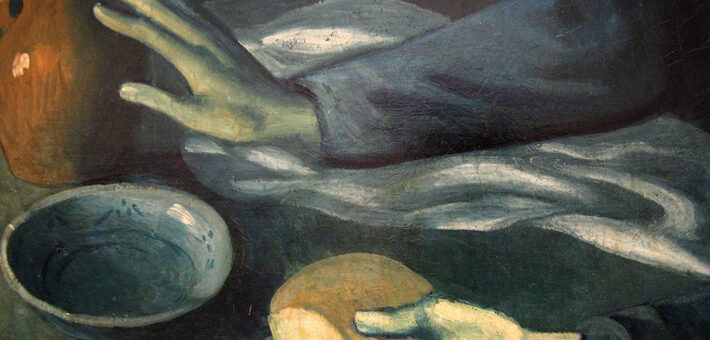Commentary on Luke 11:1-13
In Luke 11:1-13, Jesus answers a fundamental question of the life of faith — how to pray — with five petitions1 and accompanying instruction on what attitude to assume and how God will respond (see also Luke 18:1-14).
The prayer serves as an affirmation of the worldview Jesus teaches and embodies throughout Luke and suggests how the good news might be made manifest in us. If we ask, seek, and knock, Jesus says, we will surely receive and find and the door will be opened for us to the Father’s favorite and fundamental gift, which makes possible the prayer’s fulfilment: the Holy Spirit.
Jesus prays regularly in Luke, beginning with his first appearance as an adult when the Spirit descends on him (Luke 3:21-22; 5:16; 6:12; 9:18). In the passage immediately preceding our text, he has commended an attitude of attentive listening, Mary’s “better part, which will not be taken away from her” (10:38-42), over anxious busy-ness as the proper mode of discipleship. A few verses before that, rejoicing in the Spirit, Jesus has addressed God repeatedly as “Father” (10:21-22), which he now instructs his followers to do.
References to God as “Father” open and close Jesus’ teaching on prayer. If we read only this text, we know that the Father responds to prayers with a goodness that is incomparably greater than that of earthly parents. Elsewhere in Luke we find that the Father loves mercifully (Luke 6:27-36) beyond the limits of human reason or fairness and beyond our ability to meet God’s love with our own — although to do so is life and our highest calling (10:25-28). The Father’s love unfolds most vividly in the parable of the compassionate father (15:11-32): whether our tendency is to squander God’s gifts or to hoard them, however we may be lacking in love for God and neighbor, still the Father loves us relentlessly. We are pushing against an open door when we pray. In a sense, we are already inside, children tucked in for the night, not merely the friend of a friend, not even merely the friend of the Son, but sons and daughters ourselves with the same Spirit, the same love.2
With the first petition we recognize God as the very source of holiness and seek to approach God with the joyful reverence of love. Mary says something similar at the beginning of her poetry of praise (Luke 1:49). The Greek word translated “hallowed” is elsewhere translated “sanctified,” something we most often think of as happening to us. God makes us holy, as we see in 11:13 with the gift of the Spirit, and in that gift, we find in ourselves the beginning of the answer to this petition, the beauty of holiness at work in our lives in a way that makes God feel at home. When we look at what happens when the Spirit blows through the characters of Luke 1-2, we can imagine what this breath of holiness might look like in us: joy, wisdom, impossible newness, life.
When we ask in the second petition for the coming of the kingdom, we are again asking for a gift God wants to give. The kingdom is already revealed in Jesus (Luke 1:33; 11:20; 17:20-21) if sometimes hidden underground or like yeast in not-yet-risen dough (Luke 13:18-21), still to be revealed in fullness (Luke 21:31; 22:16-18, 29-30). In the meantime Jesus’ followers are to proclaim it, as Jesus proclaims it (Luke 4:43; 9:11; 10:9, 11), which means coming to know it for what it is; we glimpse it in Mary’s poetry (Luke 1:46-55), Jesus’ mission (4:18-19), and the sermon on the plain (6:20-49), which opens with the promise of the kingdom to the poor (for the rich, see 18:24-25). God desires to give it and encourages us to embrace it even now (12:31-36).
Relative to the coming of the kingdom, the prayer for bread seems rather small. That is perhaps the point, that we are invited to turn to God in all things and, like ravens and lilies, trust in God’s mercies new every morning without fretfulness or fear because the Father knows our needs (Luke 12:22-24, 29-31). The prayer recognizes that we do need the essentials, but only enough of them, not dangerous excess. Inherent in the petition, beyond the hope that we will neither worry nor hoard, is a desire to be so fully awake to the day-to-day things of life that we will not miss Jesus’ presence with us by the power of the Spirit, even in the breaking of our bread (Luke 22:19; 24:30-35).
Forgiveness is a key theme throughout Luke (e.g., 1:77; 3:3; 7:36-50; 24:47). “Release,” another translation of the word for “forgiveness,” appears twice in Jesus’ mission statement, in release for the captives and the oppressed (Luke 4:18). Forgiveness offers release from spiritual captivity — for the forgiver as much as the forgiven. Both acts figure in the petition, not because God will not forgive our sins unless we release others from their debts but because we hope to model our love on God’s mercy to us (Luke 6:34-36; 17:26); in forgiving others we free ourselves to experience God’s forgiving love more fully, which makes us love still more (7:47). The reference to release from debts (also 7:41-43) reminds us that money is an affair of the spirit (18:18-27; 19:1-10).
Finally, we request deliverance from temptation (NRSV: “time of trial”) that can cripple or destroy the soul (Luke 8:13). Immediately after the Gospel opens with bursts of Spirit-filled joy and shortly before it closes in the same way, we find references to this sort of temptation. Jesus, full of the Spirit, is tempted by the devil (4:2); then, in the end, when Satan’s moment comes (4:13; 22:3), Jesus twice tells the disciples to pray that they may not come into temptation (22:39-46). The Spirit leads Jesus through the wilderness and will teach Jesus’ followers what to say when they face their trials, so the ultimate answer to the final petition, as to the rest, is in the gift the Father wants to give. The fire that inspires and guides Jesus’ followers through the events of Acts also clothes us in power (24:49).
The holy Father wants us to knock and find the Spirit waiting to enliven, feed, and defend us. The point of prayer is not to change God’s mind but to shape ours, to make us fit for the kingdom, ready to live the only life possible in God’s household: one of love.
Notes:
1 For the longer version we usually pray, see Matthew 6:9-13 and the Didache.
2 Those whose experience of earthly fathers is complicated or destructive might consider other words for God’s love.


July 24, 2016